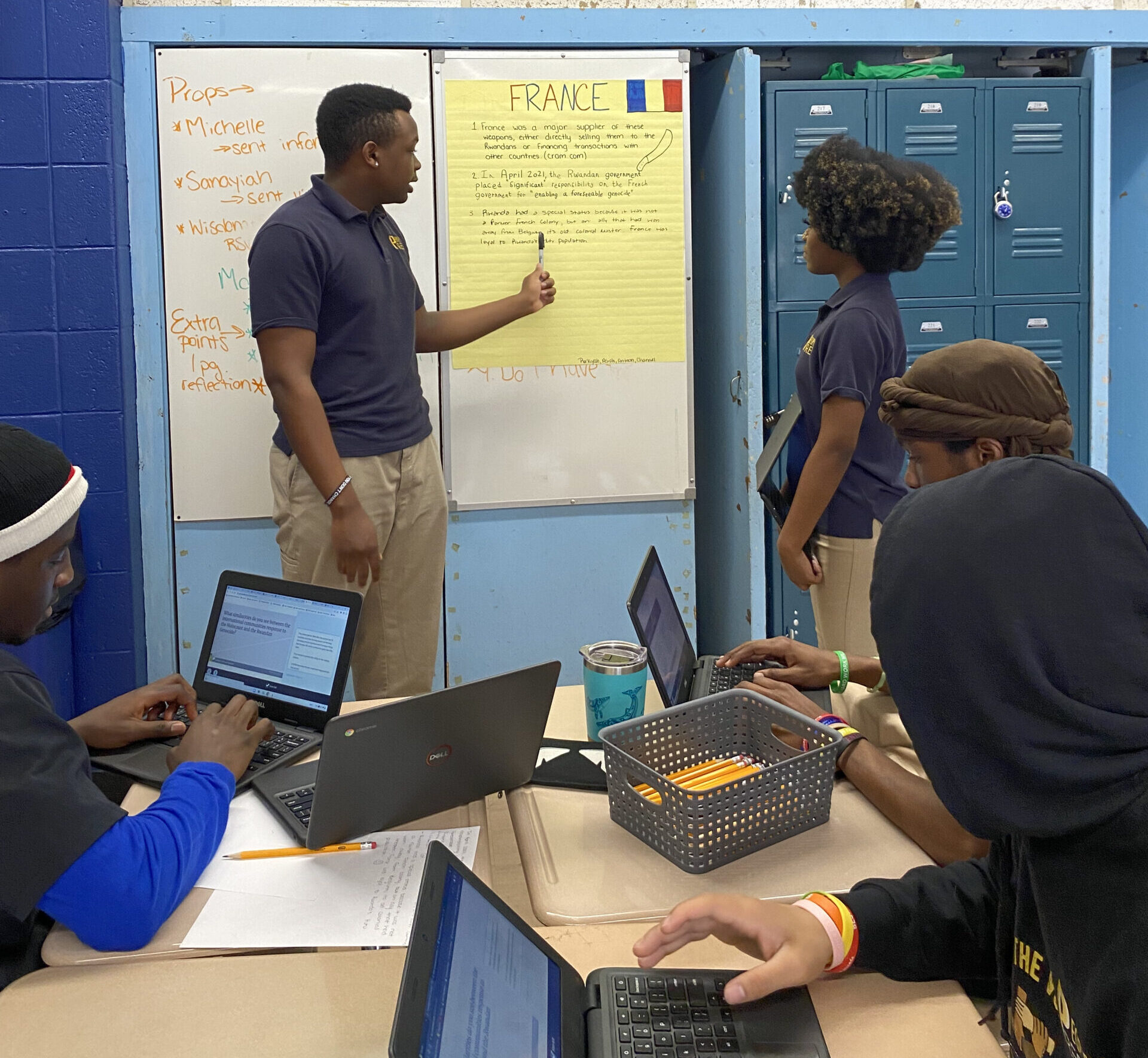On May 14, 2018, I got the phone call we all dread—my mother was in the hospital, unresponsive, and not expected to pull through. I quickly informed my boss, went home to pack, and began the eight-hour drive to Kentucky. It was an inauspicious end to my first year as a doctoral student at Marquette University.

Based on his experience, offers insights on how students can seek help during stressful situations and how faculty, in turn, can provide support. Jill Malouf/Wikimedia Commons/CC BY-SA 4.0
Two weeks before, I’d received a similar call. At the time, I was finishing up coursework and preparing to administer the final exam in the course for which I served as a teaching assistant. I spoke with my professors, received extensions on my assignments, and let my supervising professor know that I would most likely miss the final. Thankfully, soon after I arrived at the hospital, my mother recovered. I returned to Marquette, finished my coursework, and administered and graded the finals. The second time, however, my mother never regained consciousness and passed away four days later.
Graduate school is challenging under the best of circumstances; the added strain of illness or sudden loss only makes things harder. Certainly, tragedy can strike any student at any time, but a variety of factors place certain students at higher exposure for these family-related stressors. Many nontraditional students have family members who face the care issues associated with aging, or they have started their own families and have spouses and children they are now responsible for. Some students have both elderly parents and young infants. Add the insecurity of coming from a disadvantaged background, and the difficulty in overcoming a tragic event increases exponentially. In many ways, I was lucky. The timing of my mother’s death—at the end of the academic year—allowed me time to settle her estate and deal with other issues associated with her passing. That summer, however, held more tragedy for me—my stepfather also passed away a few months later.
I would be lying if I said that all of this did not impact my performance the following academic year. To stay occupied, I threw myself into coursework and attempted to make up for the summer of lost qualifying exam preparation, but despite these efforts, I often found myself listless and unmotivated. I’m not sure I would have been able to continue my studies without taking a break had it not been for Marquette’s graduate student community and faculty. They offered support in crucial ways—assignment extensions, covering discussion sections, and comradery—that was crucial in fulfilling my duties as a teaching assistant but also in staying on track toward candidacy. Based on my experience, I offer here some insights on how students can seek help during such stressful situations and how faculty, in turn, can provide support.
For Students
Be forthcoming with your professors. This sounds simple, but it can be challenging. During my junior year at Murray State University, my mother experienced a cognitive break due to her chronic illness and had to undergo rehabilitation in a temporary convalescent facility. Even though she was in a 24/7 care facility, I found juggling her care needs, working, and commuting to campus for a full course load very stressful. My performance suffered, and I came close to dropping out. Thankfully, my undergraduate mentor, David Pizzo, approached me when he noticed that I was struggling. After I confided in him, Pizzo helped me communicate with other professors and come up with a revised assignment schedule that allowed me to continue. I learned that faculty can be flexible as long as they know what is going on. Since then, I began every semester by letting my professors know about my mother’s disability and what I would need to do in case of an emergency.
Everyone’s situation is different, but it never hurts to be proactive. Whether it’s a divorce, a death in the family, serious illness, or a loved one’s upcoming surgery, let the relevant faculty and administrators know. You don’t have to provide a lot of details, but keep at least your advisor and director of graduate studies in the loop.
Graduate school is challenging under the best of circumstances; the added strain of illness or sudden loss only makes things harder.
Open up to fellow students in your department. Marquette has a History Graduate Student Organization that facilitates professional development and coordinates social activities for students. Graduate students in history also share an open-air mezzanine as our office space. Taken together, this equates to students spending a lot of time together. The advantage of such close working conditions is that you get to know your fellow students exceptionally well. Not only are you taking courses together, but you are working and relaxing with the same group of people. Eventually, you develop relationships that are beyond that of cohort mates or coworkers. Your department may not be arranged similarly, but it is vital that we seek out opportunities to make connections with our colleagues, who can provide meaningful support in a variety of ways. Their texts, emails, and phone calls helped me get through some tough times, and they stood ready to fill in for me, if needed. During my first semester, students came together to help out a doctoral candidate who needed surgery. His advisor reached out to the graduate community, and we covered his discussion sections and proctored his tests. Students who’ve completed coursework often begin to lose contact with other students. Cultivating relationships with your colleagues, especially those with whom you share an advisor, can go a long way in maintaining a support system within your department.
Take advantage of your university’s support services. Most universities have counseling services on campus that are available to both undergraduate and graduate students. These services are staffed with professional counselors who can provide a variety of services in a private and confidential setting. Take advantage of these services, and do not discount them as being merely oriented toward undergraduates.
For Faculty
Pay attention to your students’ performance. It’s no secret that faculty are already being pulled in several directions. Between research, teaching, and service, they have many commitments vying for their limited time. On top of this, their knowledge of and familiarity with the graduate students in their classes can vary depending on a number of factors. However, faculty should be vigilant for changes in students’ behavior and performance—even first-year students with whom they have limited contact—as they are often warning signs. The intimate nature of the graduate classroom can make observing these changes easier. In my case, if my undergraduate mentor had not noticed a decline in my performance, I likely would not have finished my bachelor’s degree. Faculty who see something amiss should reach out to the student in whatever way feels comfortable to them, whether it is speaking with the student after class or asking them via email to stop by during office hours.
Everyone’s situation is different, but it never hurts to be proactive.
Be genuine in your approach. On my first day back on campus last fall, I found a card from Phillip Naylor, a history professor at Marquette, on my desk. He expressed condolences and offered words of support. This small gesture meant a lot to me and helped ease my transition back into academic life. It made me feel like I was a part of the department and had a home at Marquette—a grounding I sorely needed. Dr. Naylor was not the only Marquette professor to reach out to me and provide support. What mattered was the authenticity of the faculty’s approach. Give students space to open up when they’re ready. And some students—especially those going through trauma—prefer “normal” conversations at times to not feel like they’re burdening others with their problems. Allowing students the space to open up about what their issue is can be vital in establishing trust.
The longer you are in the academy, the likelihood of students experiencing life-changing events will continue to rise. It is incumbent on all stakeholders—students, colleagues, and faculty—to work together so that the academic community can provide the support that students of diverse backgrounds need to finish their degrees.
Benjamin Linzy is a Ph.D. candidate in American history at Marquette University. He studies the policing and suppression of dissident movements in the early twentieth century.
This work is licensed under a Creative Commons Attribution-NonCommercial-NoDerivatives 4.0 International License. Attribution must provide author name, article title, Perspectives on History, date of publication, and a link to this page. This license applies only to the article, not to text or images used here by permission.


